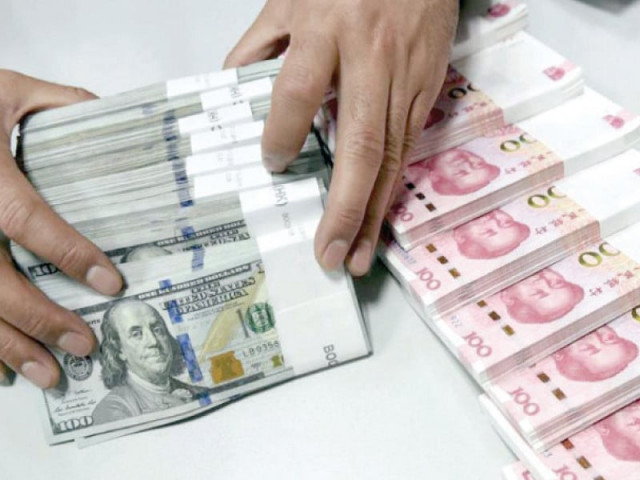SBP facilitated govt debt: report
Says central bank provided indirect loans to govt leading to high inflation

An independent think tank has criticised the State Bank of Pakistan (SBP) for its role in implementing fiscal expansionary policies by indirectly providing loans to the federal government, a move that has rendered the International Monetary Fund (IMF)-guided changes in the central bank law ineffective.
In its report titled “Pakistan Economic Freedom Audit: The Sound Money,” the Policy Research Institute of Market Economy (PRIME) has underscored the adverse implications of the central bank-finance ministry nexus, which has led to high inflation and contributed to debt accumulation.
While the amended SBP Act has curtailed the government’s capacity to issue debt directly to the SBP, monetary expansion has persisted. The PRIME report indicates that the SBP has supplied liquidity to banks, which subsequently lend it to the government. The report was authored by Dr Wasim Shahid Malik.
The PRIME stated that the SBP has mainly supplied liquidity to scheduled banks through Open Market Operations, allowing them to subsequently lend to the government. Thus, the SBP indirectly provided funds to the government through scheduled banks. According to banking industry sources, as of the first week of this month, the central bank had lent Rs10.3 trillion to commercial banks through open market operations.
The PRIME remarked, “Setting the policy rate to contain inflation while expanding the money supply in response to government borrowing from scheduled banks is unproductive.”
Under the last Extended Fund Facility (EFF), the IMF had prohibited the federal government from directly borrowing from the central bank. However, the government circumvented this restriction with the complicity of the central bank, which facilitated government borrowing through indirect means.
Over the past five years, broad money has seen an average annual growth rate of 14.6%.
Read PSX bounces back on SBP, IMF optimism
During the fiscal year 2022-23, Pakistan witnessed a significant increase in its annual inflation rate. While the average annual inflation rate over the past decade stood at 9.6%, the fiscal year 2022-23 recorded a rate of 29.2%, marking the second-highest rate in Pakistan’s history.
The zero borrowing restriction has not helped in containing the money supply; instead, it increased the cost of borrowing for the government. The central bank prints notes and sells them to commercial banks, which, in turn, lend the money to the government at higher rates.
PRIME noted that the SBP recently adopted a reactionary stance in response to inflation and currency depreciation. However, this approach proved to be ineffective. The interest rate, serving as the SBP’s monetary policy instrument, has had little success in controlling inflation and exchange rates.
During the fiscal year 2022-23, Pakistan experienced a historically high depreciation of its currency value, prompting questions about the effectiveness of monetary policy instruments, added the report. In response, the SBP raised the policy rate from 9.75% in January 2022 to an unprecedented 22% in June 2023. However, despite this substantial increase, the market did not perceive a tight policy stance, leading to prevailing market uncertainty. Consequently, the Pakistani Rupee depreciated significantly against major currencies, accompanied by a historically high inflation rate.
The PRIME highlighted that the overvaluation of the exchange rate has resulted in a trade deficit, leading to external debt accumulation. These factors contribute to the monetary fragility currently facing Pakistan. The PRIME report has proposed holding the government accountable for violating the Fiscal Responsibility and Debt Limitation Act and introducing new legislation to prevent currency manipulation by the government.
“An Act of Parliament can restrict the deliberate overvaluation of the exchange rate, for which a suitable indicator needs to be developed,” it recommended.
Pakistan economic freedom rating falls
The report highlighted that Pakistan’s sound money rating has reached its historically lowest level due to high inflation and double-digit growth in monetary expansion. Fluctuations in the sound money rating were driven by recent inflation, its volatility, and monetary growth in the near past, while the score on foreign currency accounts remained stable, according to PRIME.
Recent assessments reveal that Pakistan’s sound money rating for 2023 is 4.6, the lowest in history, primarily due to exceptionally high inflation during the year, it added. Pakistan’s economy’s sound money category was assessed using the Fraser Institute methodology.
This score reflects a concerning state of affairs regarding the country’s economic freedom. Specifically, Pakistan’s performance has significantly declined compared to the last two ratings, with a decrease of one quarter. This score is the country’s lowest in the past four decades.
The value of money has consistently depreciated over time. From 1974 to 2001, its purchasing power for goods and services included in the CPI basket declined by one-tenth, and from 1974 to 2023, by one-sixty-eighths. The Pakistani Rupee has also experienced a similar decline in value against foreign currencies. For instance, the value of one US dollar in Pakistani rupees increased from less than 10 in 1974 to 248 in 2023, resulting in a 25-fold cumulative loss.
However, monetary growth during this period exceeded 1000 times, indicating inefficiencies in both monetary and fiscal policies that have contributed to this expansion and, ultimately, the devaluation of money.
Published in The Express Tribune, March 30th, 2024.
Like Business on Facebook, follow @TribuneBiz on Twitter to stay informed and join in the conversation.



















COMMENTS
Comments are moderated and generally will be posted if they are on-topic and not abusive.
For more information, please see our Comments FAQ